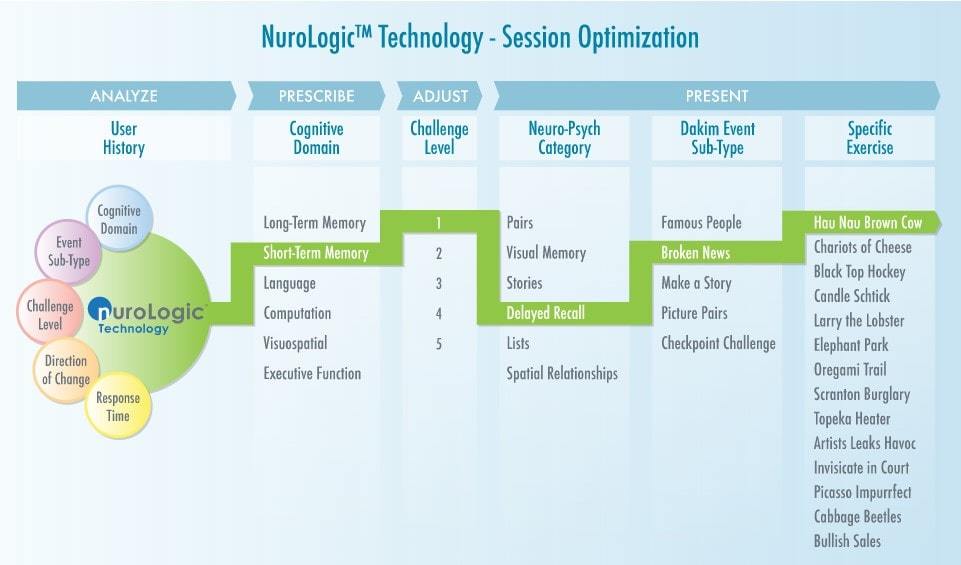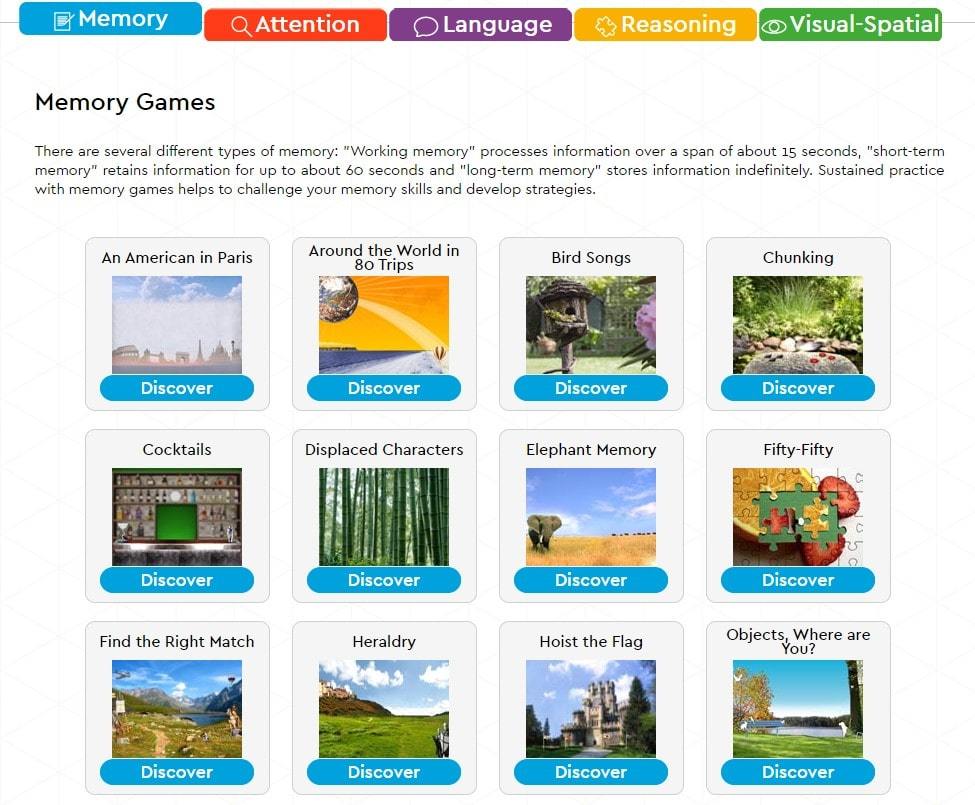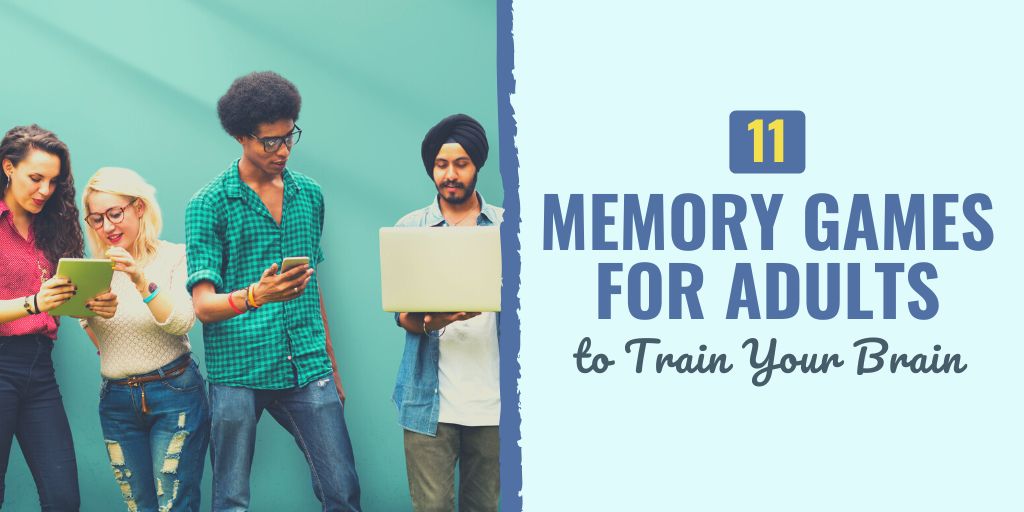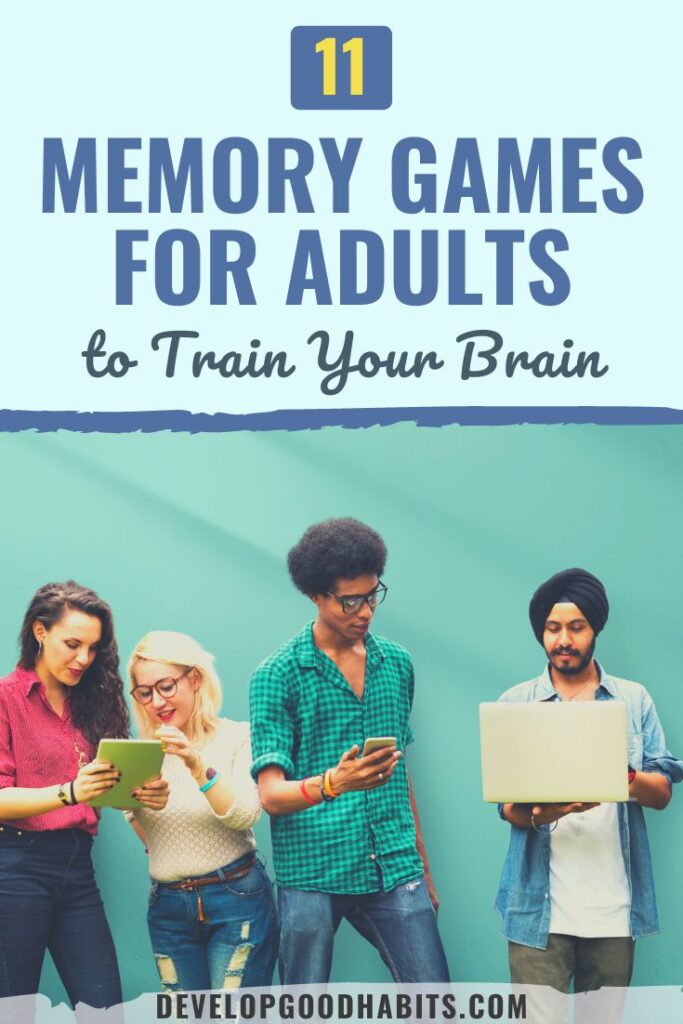If you’re a regular on this site, you know that exercising your brain is just as important as exercising your body.
The difference, though, is that a lot of people dread working out and see it as being a chore. But brain games are fun, and challenging in a less…burdensome way.
I think you will be surprised to know that age-related cognitive decline can start to occur in healthy, educated people who are merely in their 20s and 30s.
So you definitely should be challenging your brain at every age, but as you get older, playing brain games in addition to maintaining other healthy habits is an important factor in keeping your memory sharp.
Not only will playing brain games reduce or delay your risk for cognitive impairment during your later years, it will also strengthen certain thinking skills that usually decrease with age, such as your:
These thinking skills are naturally used less on an everyday basis as you get older, especially if you’re out of the workforce. Because of this, stimulating your brain through memory games can help strengthen valuable mental skills that you will continue to rely on every day.
Lastly, playing memory games can help you build up your cognitive “savings account”.
Your cognitive reserve is like a savings account in the sense that you can store away some extra cognitive energy to use in a crunch when you need to do some quick thinking. Plus, your cognitive reserve can help your memory stay resilient.
In this article, we are going to look at 11 memory games for adults to help keep your thinking skills as sharp as possible.
With the variety of games we will cover, you’re sure to find a few that will interest you. While all of these games are different, they’re all sure to prompt your thinking and challenge your logic.
Let’s get going.
11 Memory Games for Adults to Train Your Brain
1. Dakim
Dakim is a website that offers a “brain fitness program”. They offer users a clinically-proven comprehensive brain workout through games and puzzles that are designed to help significantly improve cognitive performance in short- and long-term memory, concentration, and focus.
In each of this site’s 100+ options for brain-training exercises, Dakim BrainFitness cross-trains users’ brains in six of the essential cognitive domains (long- and short-term memory, language, computation, visuospatial orientation, and executive functioning.)
You can try the program for free, but the software is $249.00 if you want full access for personal use. Dakim also sells its program to senior living facilities at varying costs.
Users appreciate that this program offers a few unique attributes that make Dakim stand out from other computer brain games, such as:
Dakim uses its patented NuroLogic™ Technology, which tailors each user’s experience in real time by monitoring their progress through each session.
NuroLogic Technology is then able to personalize the sequence and challenge level of the exercises presented (across the six cognitive domains) to match the user's performance.
This helps ensure users get a comprehensive cognitive workout to get the most out of every session. This is the process used to adjust the exercises as needed:

This is a great option for those who are beginning to feel the impact of aging on their brain and want to engage in more cognitive exercises on a regular basis.
2. Happy Neuron
Happy Neuron is a website that offers games and activities to exercise users’ memory, attention, language, executive functioning, and visual/spatial reasoning.
Happy Neuron personalizes the training to fit each individual user, tracking your progress, and presenting you with games that are based on scientific research.
Happy Neuron offers a 28-part series of computer games focusing on the above-mentioned brain functions. Examples of exercises include rebuilding an intricate medieval shield as fast as you can, or retracing your virtual route through a popular city.
Happy Neuron's team of neuroscientists and computer engineers say that this type of mental cross-training helps to formulate and maintain critical thinking skills, such as memory.
Here is an example of what some of the memory games look like:

You can try this program for free for seven days, but after that, it costs $10 per month or $100 per year to access.
3. Keep Your Brain Alive by Lawrence Katz and Manning Rubin
Check Price on Amazon | Check Audiobook Price
Keep Your Brain Alive: 83 Neurobic Exercises was written by a neurobiology professor from Duke University, Lawrence C. Katz, Ph.D., and Manning Rubin. In it are 83 “neurobic” (neuro + aerobic) exercises that use all five of your senses in unusual ways to keep your brain strong and healthy.
Based on the most recent neuroscience, these exercises are deceptively simple, but will stimulate your brain in a way that will encourage the growth of new brain cells and new cerebral nerve connections.
The exercises explained in this book will help you break your everyday routines in a way that will keep your brain guessing and engaged. The activities are made to stimulate the nerve cells in your hippocampus and cerebral cortex, which are the areas of your brain responsible for memory and creativity.
The authors make the point that maintaining cognitive health requires people to use all five senses in unexpected ways so you can stay mentally fit enough to meet daily challenges like remembering someone’s name, learning a new skill, and maintaining your creativity.
Living on autopilot every day will lead to atrophy in the brain rather than growth.
The nine chapters in this book cover:
A neurobic should do at least one of the following:
- Involve at least one of your senses in a new way (smell or taste something new)
- Involve all of your attention, even if briefly
- Change your routine in a significant way
Some examples of neurobics include doing everyday activities such as:
All of these things take you out of autopilot and help you feel more focused and alert. Many readers have found this book to be very helpful in providing ideas for everyday cognitive exercises.
4. Chess
While some people think that Chess is only for especially mentally gifted people, this is a wide misconception.
Sure, there’s some type of relationship between the ability to play Chess well and one’s overall intelligence, as playing Chess involves using various parts of your brain.
But all types of people enjoy this game–and some even become masters. However, there are also some incredibly smart people who never play beyond a beginner level.
Playing Chess is a beneficial hobby for anyone because doing so can result in better cognitive function and improved memory.
Chess gives people a tool to engage in a rigorous brain workout. And, as the most crucial organ in the human body, when your brain doesn’t get any stimulation, the cells start to die.
In order to play chess, you must use both hemispheres of your brain, as you’re working on object recognition and pattern recognition. Over time, using the techniques in this game will work out and develop both sides of your brain.
When it comes to improving one’s memory, chess involves tactics and strategies that players learn as they go. This means that the more you play, the better your memory will become because you will be able to start to recall and use different strategies and tactics.
The key part to this is that the memory benefits of chess are not limited to the game — your improved memory will be apparent in other areas of your life such as your responsibilities, commitments, etc.
If you don’t have a chess set, here are three great options:
5. Educational Insights Brainbolt – Brain Teaser Memory Game
BrainBolt is a light-up memory game that challenges your brain to remember a light sequence, which helps you work your cognitive skills by requiring concentration and sharp short term memory skills.
Users have to follow along with the lights and watch, remember, and repeat the pattern as long as possible before making a mistake.
This is a great game to play alone, but it also offers a two-player option, a timed mode if you want to play a fast-paced game, and an advanced mode for those who have become experts. Users find this to be an addicting game to play until you can beat it.
This is a great option to bring with you while you’re travelling, as it is a handheld game that only requires three AAA batteries to play. This is a great option for kids and adults alike, as many find it to be challenging and fun.
6. SmartGames IQ Puzzler Pro, a Travel Game for Kids and Adults
This IQ-Puzzler Pro will help train your brain with 120 (2D and 3D) challenges in 3 playing modes. Due to its wide variety of game options, it is great for people of all ages.
Anyone can find a challenging game to play with this that can push their brain to new limits. The games help build your concentration skills, problem-solving skills, visual/spatial logic, and planning skills.
This is a great option for travel due to its compact size and travel case. While it is a single-player game, people often like to team up with a partner to try to solve challenges together.
This game comes with a compact game board, 12 colorful puzzle pieces, and a booklet that includes 120 challenges and solutions. It also comes with a free app that you can download that includes features to enhance your experience with this physical game.
Users appreciate how challenging this game becomes because it never gets old. It will keep you thinking and help train your brain by engaging you in the puzzle for hours.
For more games for the younger crowd, check out this roundup of the best memory games for kids.
7. Sudoku
This game of logic, problem solving, and uncovering patterns is a brain game that helps stimulate cognitive function and offers people the satisfaction of finishing a tough puzzle.
Your memory and your logic work in tandem when you’re playing Sudoku. You have to use your memory to memorize the numbers and your logic to fill in the blank spaces.
The University of Edinburgh found that doing Sudoku can help activate “survival genes” in your brain that otherwise remain dormant. They report that these genes help elongate the lifespan of brain cells and help people resist memory-depleting diseases such as strokes.
Sudoku also helps train your brain because it requires you to think strategically and be creative in your problem solving.
If you stop playing when you’re in the middle of a game, you’ll have to restart the entire thinking process, which helps jog your memory and helps to develop your concentration abilities and re-focusing skills.
Here are 5 great Sudoku options:
8. Super Brain Yoga
Super brain yoga is a short and simple physical exercise that will help improve your memory and increase your brain power.
It boosts the electrical activity in your brain, which activates it and gets it running properly. This practice has caught on among both professionals and educators.
To do super brain yoga:
Here is a Super Brain Yoga routine you can follow.
Super brain yoga activates the pressure points around your earlobes that help stimulate the production of gray matter in your brain. It benefits your brain by:
9. The Tray Game
Ask a friend to get some sort of tray and put a lot of random items on it. Look at the items on the tray and then have your friend either take it away or cover it with a cloth.
Try to remember and then write down all of the items that were on the tray.
There are a lot of variations that you could make for this game, including looking at a picture online and then minimizing it and trying to recall the contents. But no matter how you do this, you’re testing and exercising your memory by working on remembering physical objects in the short-term.
10. The Grocery List Game
There are a lot of variations of this game, but all of them can help improve memory function.
For this group game, gather some people and form a circle. The first person begins the game by saying, “I went to the store and bought…” Go around the circle and have each player add an item to the end of the list after naming the items that all of the previous players have said in order.
The object of the game is to remember as many items as you can in the correct order. The first person to mess up the order or to forget an item loses.
This is a quick and easy activity to play with friends to test and practice your ability to recall information. This activity strengthens the connections in your brain that enhance your brain’s ability to remember things and improve your memory with time.
You can change the first sentence of this game to make it personal to your group. One idea is to use “My favorite books are…” because recalling long book titles makes this game even more difficult.
11. The Total Brain Workout by Marcel Danesi
Of course you know that different areas of your brain control various cognitive functions, and that as long as you exercise your brain, you can make each area of your brain stronger.
Well, The Total Brain Workout: 450 Puzzles to Sharpen Your Mind, Improve Your Memory & Keep Your Brain Fit offers hundreds of challenging and fun puzzles that are designed to target the parts of your brain that are responsible for language, reasoning and logic, memory, and visual perception.
Each of the 450 puzzles range from easy to advanced, so you can tailor your cognitive workout to your current level of functioning. Furthermore, each puzzle tells you exactly which area of your brain is being targeted as you’re working through it and the cognitive functions that are being controlled.
This allows you to customize your own brain workout to your personal needs and the specific areas you want to improve.
Final Thoughts on Memory Games for Adults
While adults often leave games in their past, they’re missing out on a big opportunity to gain cognitive benefits. Just as games are important for brain development in childhood, games are also imperative for brain health in adults.
As a natural part of life, memory loss commonly leads to issues with long- and short-term memory as people age.
While it may be common, memory loss can lead to negative consequences for adults’ health, as it increases the risk of slips and falls and it can prevent older adults from taking important safety precautions in their homes.
While no single app or game will be the magic bullet for eliminating the chances of experiencing age-related cognitive decline, the games and exercises laid out in this article can help keep your brain engaged while you age.
One of the best ways to keep your memory sharp is to embrace the benefits of playing! To make it more challenging, you can even take a memory test before and after you play certain memory games, and then compare your results.
If you're looking for other worthwhile games, here are several educational games and apps for adults that we recommend:
- 8 Best Online Educational Game Sites & Apps for Adults
- 4 Best Mindfulness Games for Adults (Our Review)
- 11 Best Memory Test Websites & Apps

Connie Stemmle is a professional editor, freelance writer and ghostwriter. She holds a BS in Marketing and a Master’s Degree in Social Work. When she is not writing, Connie is either spending time with her 4-year-old daughter, running, or making efforts in her community to promote social justice.














